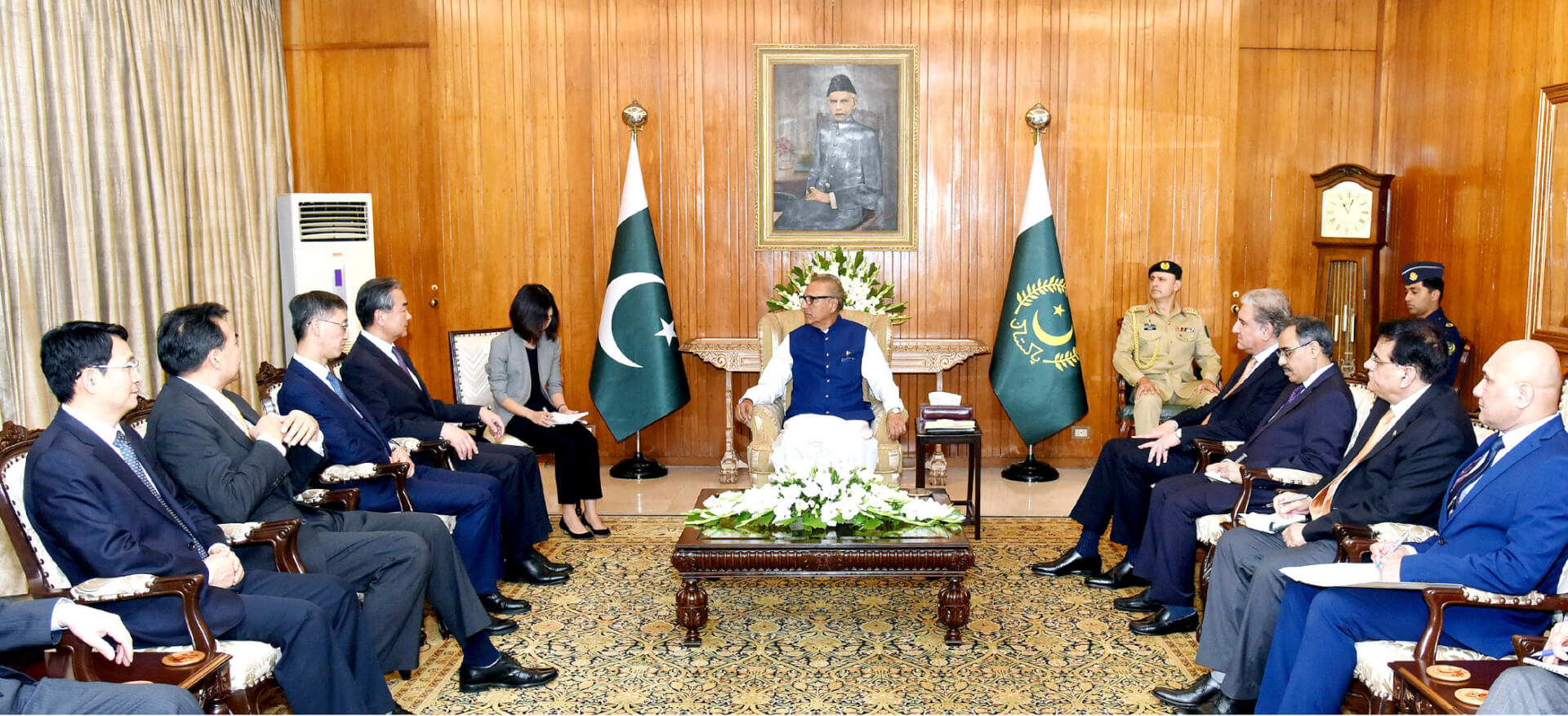During a meeting with Chinese State Councilor and Foreign Minister (FM) Wang Yi in Islamabad on Tuesday, Pakistani President Dr. Arif Alvi said Pakistan will adhere to the “One China” policy on all fundamental issues, including Taiwan, Tibet, Hong Kong, and the South China Sea.
Reiterating the fact that Pakistan and China were “all-weather strategic cooperative partners,” Alvi thanked China for its cooperation in the Kashmir conflict and with the Financial Action Task Force. He also thanked Beijing for sending the Chinese made J10CE fighter jets and stressed the importance of increased collaboration in agriculture, automobiles, and information technology.
In response, Wang reaffirmed China’s support for Pakistan and assured that Beijing will continue to assist Pakistan’s economic and industrial development. He also noted that the China Pakistan Economic Corridor (CPEC) project will significantly contribute to Pakistan’s long-term growth.
Wang also met with FM Shah Mahmood Qureshi. Qureshi expressed his willingness to expand cooperation in various fields such as agriculture, economy and trade, finance, and information technology. The Pakistani FM voices his hope that China would increase investment to accelerate the country’s industrialization process.
Mr. Wang Yi, China's State Councilor and Foreign Minister, pays a visit to President Dr. Arif Alvi at Aiwan-e-Sadr@CathayPak @WangXianfeng8 @PakAmbChina @zhang_heqing @AmbNong @ArifAlvi pic.twitter.com/ZbVITkHbO5
— CPEC Official (@CPEC_Official) March 22, 2022
Wang responded that China is ready “to expand imports from Pakistan, support Chinese enterprises in investing in Pakistan, and help Pakistan improve its capability for self-driven and sustainable development.”
Both ministers also spoke highly of the CPEC, which has “facilitated Pakistan's economic growth and its transition towards geo-economics.” They further agreed to “take appropriate measures” to advance cooperation projects in “energy, transportation and infrastructure, and promote sound, comprehensive, sustainable and high-quality development of the Corridor to turn it into an important engine of Pakistan’s economic development.”
Moreover, they also agreed to jointly confront the resurgence of terrorism by enhancing security and counter-terrorism cooperation and by cracking down on the Eastern Turkistan Islamic Movement and other terrorist groups.
Referring to the Dasu terrorist attack that happened last July in Pakistan’s Khyber Pakhtunkhwa province, Qureshi said that “safeguarding the security of Chinese personnel and projects in Pakistan is Islamabad’s top priority” and that the government “will bring the perpetrators [...] to justice and prevent similar events from happening again.”
Nine of the 12 casualties from the bus explosion were Chinese nationals. Both sides agreed that the attack must be used as “an opportunity to formulate new whole-process security measures and establish an advanced security cooperation mechanism.”
Wang and Quereshi also signed documents on promoting agricultural, educational, scientific, and technological cooperation and held a joint press conference.
Wang visited Pakistan to attend the 48th Organisation of Islamic Cooperation (OIC) foreign ministers’ conference. The meeting was also attended by delegations from Egypt, Somalia, Niger, Gambia, Bangladesh, Uganda, Tunisia, Tajikistan, Guinea Bissau, Cote d’Ivoire, Indonesia, Azerbaijan, Libya, Malaysia, and Mozambique.

